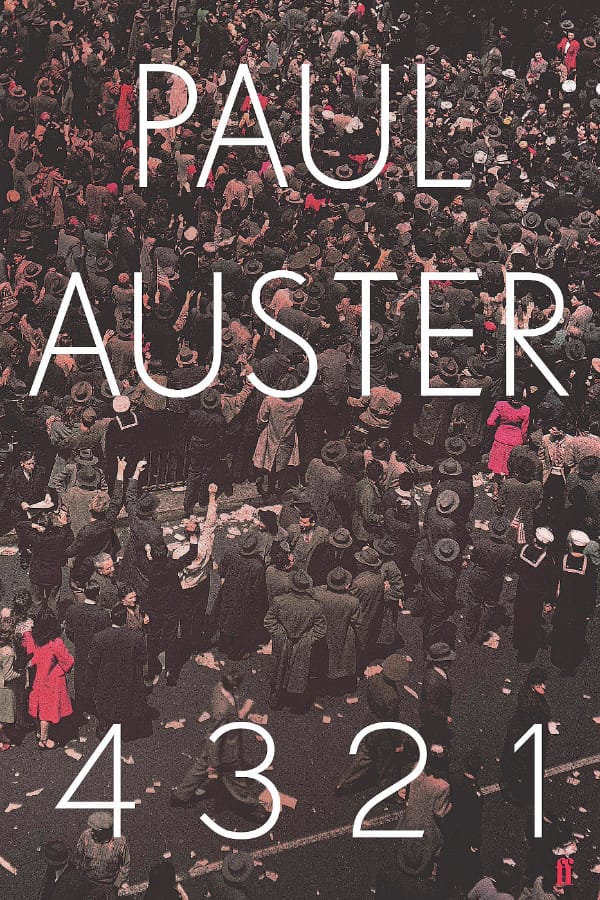The story of one life, and another, and another, and another
Paul Auster’s Booker-nominated 4321 is an audacious work of metafiction, which revels in its multiple timelines.

In 4321, Paul Auster sets out his main hypothesis on the second page. He’s telling the tale of Isaac Reznikoff, a European Jewish immigrant who moves to America at the turn of the century, and is bestowed the name Ichabod Ferguson by an immigration official at Ellis Island. A kind of immigrant-everyman, his life is tough, and money is tight, and so the only things he can give his family are stories about “the vagabond adventures of his youth.” “In the long run,” Auster writes, “stories are probably no less valuable than money, but in the short run they have their decided limitations”.
If this is the case, and written words are as valuable as dollars and cents, then 4321 is a bullion. A tombstone of a novel, it stands at nearly 900 pages long, completely impractical for reading on the move. Throughout the course of the novel, Auster takes us through the early life of Archibald Ferguson, the grandson of Ichabod, who grows up in the New Jersey-New York area in the 1950s and 60s.
Or rather, he takes us through the early lives of Ferguson, since from the off the timeline is disrupted, with four Fergusons diverging off from each other in parallel, their experiences all slightly different. Early trials and tribulations play a larger role in how the Fergusons develop than later developments, and symmetries and patterns develop between the four timelines. The Schneiderman family, for instance, play a key role in each narrative, but each time different members come to prominence; Amy Schneiderman, the daughter of the family, plays a key role, here romantic, here familial. Similarly the path that each Ferguson takes is different, from college choices to family tragedies.
“When Auster is at his most metafictional, 4321 begins to shine”
When Auster is at his most metafictional, the novel begins to shine. 4321 subverts the tired trope of the ‘immigrant novel’, turning around the idea that any individual story of hardship can encapsulate 20th Century American life. If one were to separate out the four timelines of 4321, and present each as a short novel, then each could probably be described as ‘a microcosm of the mid-century USA’ – by presenting them together Auster reveals how hollow such platitudes ring. When Auster was 14, he himself had an early brush with death, coming narrowly close to a lightning strike that killed the boy next to him. This has clear influences on 4321, with the title becoming a countdown of Fergusons remaining as the others shuffle off their mortal coil. The first of these comes less than half way through the book – a dramatic shock that is intensified by the blank chapters that take up the rest of that character’s narrative, which function as a bleak epitaph.
Auster draws on his own experiences at other points too: three of his Fergusons become writers – in a variety of disciplines – and two write books that are direct copies of the lines Auster had written earlier on in the novel. These kind of metafictional twists are what Auster does best, and 4321 is no different.
As an exercise in metafiction, Auster’s intention is clear, but 4321 still manages to hold up as a straightforward piece of fiction – an excellent thing, since it makes up for the wrist strain experienced from carrying around the tome. With lengthy, verbose sentences that run into each other in a delirious train of description, Auster contemplates a number of big themes, centring around the Jewish mid-20th Century experience, and the special place New York – “the capital of human faces, a horizontal Babel of human tongues” – has in that milieu.

Philip Roth’s 1997 masterpiece American Pastoral takes on similar themes, but while Roth’s narrative is darker, and goes further forward into the paranoiac decade of the 1970s, 4321 remains relatively buoyant. The action plays out against a backdrop of the turmoil of the 1960s, with the killing of Martin Luther King, the 1967 Newark riots, and the 1968 Columbia University protests cropping up – the casual anti-semitism of WASP America makes an impact, causing one Ferguson to reflect that “until that moment it had never occurred to him that he might not be an American, or, more precisely, that his way of being an American was any less authentic” – but the Fergusons move through relatively unscathed, and their world views remain remarkably similar, despite their different life experiences.
Auster’s sentences are a delight to read, but can have a tendency to veer into self-parody. Consider this one:
“ As Ferguson listened to Amy defend New York, declare her love of New York, it occurred to him that she herself was somehow an embodiment of her city, not only in her confidence and quickness of her mind but also and especially in her voice, which was the voice of brainy Jewish girls from Brooklyn, Queens, and the Upper West Side, the third-generation New York Jewish voice...”
The sentence then continues for the remainder of the page, and while it is beautiful, it is one of a number of moments where you feel Auster might have required a firmer editing hand. Similar issues crop up towards the end of the novel, where things come together a bit too neatly – the threads of destiny are tied together by Auster in a way that, to me, came across as trite. That being said, 4321 remains a powerful experience – Auster has managed to sustain a simple conceit through an epic length, thanks to his powerhouse control of the written word. In the long run, that is definitely worth its weight in gold.
With the Man Booker Prize being announced Tuesday week, Felix Books will be reviewing more from the shortlist over the next couple of weeks.









